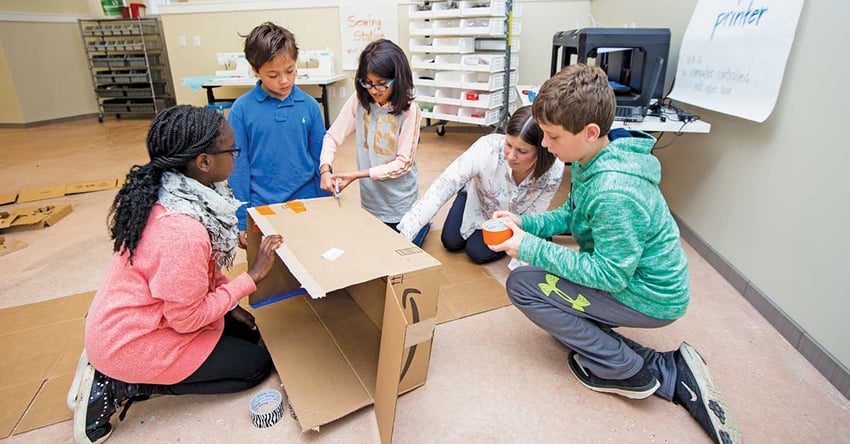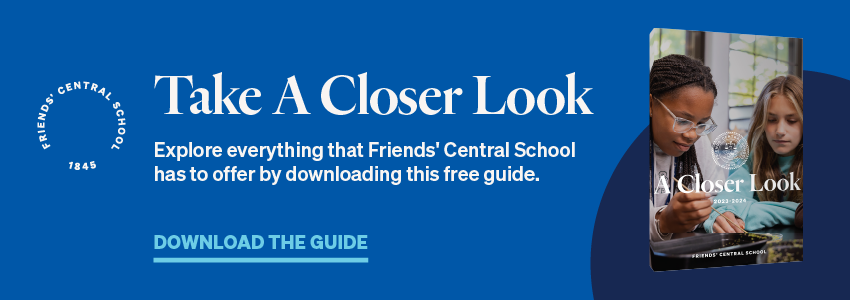
The process of deciding whether your child should attend a public school or an independent school is profoundly important: There are so many factors that you must take into consideration before making a final decision. What are the pros and cons of an independent school education compared to a public school? How will my child get to and from school? And, of course, are there opportunities for me to be more involved in my child’s education?
Free Downloadable Guide: Take a Closer Look at Friends' Central School
This final question is an important one to ask, and it’s an important one for independent schools to answer.
One of the common reasons that parents choose to consider switching to an independent school education is the sense that their child is no longer being well served. For whatever reason—they need more of an academic challenge, they're unengaged so their grades slip, there are issues with bullying, etc.—parents want to work together with their child's school, but struggle to find opportunities.
The good news is that an independent school education typically offers parents more opportunities for partnership, often resulting in a more differentiated experience for each child, while also offering student support, and optional programmatic extras to parents who face the logistical challenges of busy schedules or demanding careers.
If you are considering an independent or private school for your child, the points below will outline what you can expect in terms of your role in their education and as a member of the school community.
What to Expect from an Independent School Education
Whether you are a parent who is used to a more hands-on approach to your child’s education, or you are someone who expects a little more support from your child’s school, the good news is that an independent school experience is likely more tailored to your family’s needs than a public education can be.
An independent school typically:
- Offers more of a partnership between parents, teachers, and school administrators so that everyone is working together to challenge and support your child.
- Additionally, it is expected that parents and teachers are on the same team. This encourages mutual support between parents and teachers ensuring that students are challenged academically, assignments are complete, students are fully engaged, that important values are reinforced at school, and that a child’s happiness and emotional well being are valued.
- Because teamwork is the name of the game, independent school teachers will typically make themselves as available as possible to parents for conversation, whether that is a phone call in off hours, quick turnaround on an email, or a face-to-face meeting.
- Less bureaucracy means that there are fewer limitations to what teachers will and will not (or can/cannot) do with respect to helping your child meet their educational goals.
The points above are essential parts of independent school life. Programmatic extras that expand opportunties and ease logistical burdens for busy parents are also key aspects of independent schools, including:
- Most independent schools understand that learning is not limited to the classroom, or even the school day, and provide other interesting and challenging learning opportunities. Tutoring, music lessons, and clubs may all be offered during or after school.
- Most independent schools understand that every student needs some extra help at some point, so working with parents to ensure that their children are receiving the support and guidance they need to thrive is essential.
- College counseling is provided by specialists, not guidance counselors, so each student receives a personalized experience and one-on-one attention for the selective college admission process.
- It is typically expected that teachers will meet with and help students outside of class time, lessening the burden on parents or the need for outside tutors and ensuring student success.
- Teachers at an independent school care about the “whole child”—both their academic well-being and their emotional well-being. Because independent schools typically have fewer students per classroom, this allows for a greater connection between students and teachers. This is both a key to a child thriving and a safety net if needed.
A Partnership in Education
Perhaps the most important thing for parents to keep in mind is that their child’s education is, by necessity, a partnership between the parents, teachers, and school administrators. While public schools do their best with large numbers of students and, in some cases, limited resources, independent schools are much better situated to differentiate children's experiences and welcome parent’s input regarding their children.



